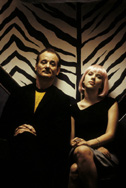
Movie Guru Rating:

Comment
on this review
| |

Lost in Translation finds itself, abroad
by Jesse Fox Mayshark
Lost in Translation is the quietest great movie of the year. It takes place in long shots and careful silences. The movie is as much about what doesn't happen as what does, and the hows and whys of it. It's also about being in an unfamiliar place (in this case, Tokyo), and the excitement and isolation of unfamiliarity. We see the city through strangers' eyes, as a blur of flashing lights and chanting monks and karaoke bars and a persistent sense of unreality. It's not a comedy, but it is often funny. It's a drama, but nothing very dramatic happens.
The movie's two American protagonists—a Hollywood star named Bob Harris (Bill Murray) on the downside of his career, and a young married philosophy graduate named Charlotte (Scarlett Johansson)—have their own reasons for being in Tokyo. Bob is making commercials for a brand of Japanese whiskey, and Charlotte has tagged along with her hotshot photographer husband, who's taking pictures of a rock band. But they're also both adrift. Bob is losing his sense of dignity; even though he's being paid $2 million for the endorsement, he knows there's something pathetic about the job. (The scenes of him filming the commercials while getting koan-like instruction from a Japanese director are among the funniest in the movie.) Charlotte is fresh out of school with no particular plans, married to a successful and driven man whom she's beginning to suspect she doesn't know very well.
Both Charlotte and Bob suffer from jet-lag and insomnia. It's no surprise that they meet in the hotel bar. What is surprising is what happens next. Director Sofia Coppola (she's Francis Ford's daughter, but after this movie I don't think she'll need that qualifier anymore) isn't interested in anything as obvious as a May-September romance. There is erotic tension between Charlotte and Bob throughout the movie, but it's kept at a simmer. What they really want from each other is a less physical kind of intimacy. They want to be understood. (Hence the title.)
The delicate balance of a new friendship might seem like a slight thing to hang a movie on. A less talented and self-assured filmmaker would have been tempted to liven it up with subplots, action or intrigue. But Coppola has both talent and self-assurance in spades, and she trusts her story to unwind at its own gentle pace. (She wrote the screenplay, too.)
Among other things, what we're seeing in Lost in Trans-lation is the emergence of a major director. Coppola's first film, The Virgin Suicides, was beguiling and mysterious, but it lacked something at the center. There were times it seemed to drift away while you were watching it. Lost in Translation has something of the same airiness, it glides and buzzes even when (as is often the case) nothing much is happening. But it's grounded in the solid ache of daily life. Coppola observes her characters in the in-between places that movies rarely pay much attention to: riding elevators, taking baths, lying around half-dressed and indecisive. Inevitable comparisons will be made to her father, but the look and feel of her movies is internationalist and jazzy—even the American suburbia of The Virgin Suicides was underscored by the French electro composers Air. She has more in common with the evanescence of Wong Kar-Wai (whose In the Mood for Love is the most obvious touchstone for Lost in Translation) than with Coppola Sr.'s baroque existentialism.
She also made perfect casting calls. Murray was apparently her first choice for Bob Harris—she wrote the part with him in mind—and it is the most complete performance of his career. He's not cast against type, exactly; he retains his smirky charisma, and we can see that the same qualities that made Murray a star are present in Bob. But by this point, those are surface reflexes for Murray, and that's how he plays them here; they're mostly a shield against a world that he's too tired to keep fighting. He's worn out, but he pulls up short of self-pity. He's too aware of his own bullshit, both personal and professional, to simply feel sorry for himself.
Likewise, Johansson makes Charlotte considerably more than a convenient pretty girl. She isn't the first movie character identified as an Ivy League philosophy major, but she's one of the few who actually seems like one. She's unabashedly smart, but she also understands the limits of theory in the face of experience. Johansson is an interesting actress who, like Charlotte, doesn't feel fully formed. In her most notable performances before this, she's been a foil, to Thora Birch in Ghost World and to Billy Bob Thornton in The Man Who Wasn't There. In Lost in Translation, she has more room, and she fills it effortlessly. There are lovely, wistful scenes of her exploring the rainy city, alternately puzzled and irritated and amused by what she finds.
The movie's only stumble is its occasional weakness for the easy cross-cultural yuk-yuk. We don't really need more jokes about how Japanese people pronounce L's like R's, do we? But the film as a whole is sympathetically global in outlook. It could just as easily be set in New York or, for that matter, Knoxville. Its not-so-subtle subtext is that cultural divides are nothing compared to the chasms between individuals, and that few things in life are more valuable than bridging those chasms—even temporarily, with a stranger, in another city.

September 25, 2003 * Vol. 13, No. 39
© 2000 Metro Pulse
|